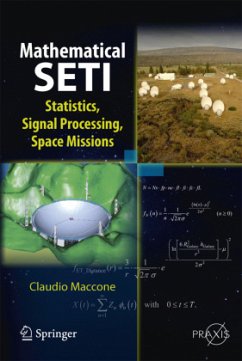
Extraterrestrial Altruism
Evolution and Ethics in the Cosmos
Herausgegeben: Vakoch, Douglas A.

PAYBACK Punkte
19 °P sammeln!
Extraterrestrial Altruism examines a basic assumption of the Search for Extraterrestrial Intelligence (SETI): that extraterrestrials will be transmitting messages to us for our benefit. This question of whether extraterrestrials will be altruistic has become increasingly important in recent years as SETI scientists have begun contemplating transmissions from Earth to make contact.Technological civilizations that transmit signals for the benefit of others, but with no immediate gain for themselves, certainly seem to be altruistic. But does this make biological sense? Should we expect altruism t...
Extraterrestrial Altruism examines a basic assumption of the Search for Extraterrestrial Intelligence (SETI): that extraterrestrials will be transmitting messages to us for our benefit. This question of whether extraterrestrials will be altruistic has become increasingly important in recent years as SETI scientists have begun contemplating transmissions from Earth to make contact.
Technological civilizations that transmit signals for the benefit of others, but with no immediate gain for themselves, certainly seem to be altruistic. But does this make biological sense? Should we expect altruism to evolve throughout the cosmos, or is this only wishful thinking? Is it dangerous to send messages to other worlds, as Stephen Hawking has suggested, or might humankind benefit from an exchange with intelligence elsewhere in the galaxy? Would extraterrestrial societies be based on different ethical principles, or would we see commonalities with Earthly notions of morality? Extraterrestrial Altruism explores these and related questions about the motivations of civilizations beyond Earth, providing new insights that are critical for SETI.
Chapters are authored by leading scholars from diverse disciplines-anthropology, astronomy, biology, chemistry, computer science, cosmology, engineering, history of science, law, philosophy, psychology, public policy, and sociology. The book is carefully edited by Douglas Vakoch, Director of Interstellar Message Composition at the SETI Institute and professor of clinical psychology at the California Institute of Integral Studies. The Foreword is by Frank Drake.
This interdisciplinary book will benefit everybody trying to understand whether evolution and ethics are unique to Earth, or whether they are built into the fabric of the universe.
Technological civilizations that transmit signals for the benefit of others, but with no immediate gain for themselves, certainly seem to be altruistic. But does this make biological sense? Should we expect altruism to evolve throughout the cosmos, or is this only wishful thinking? Is it dangerous to send messages to other worlds, as Stephen Hawking has suggested, or might humankind benefit from an exchange with intelligence elsewhere in the galaxy? Would extraterrestrial societies be based on different ethical principles, or would we see commonalities with Earthly notions of morality? Extraterrestrial Altruism explores these and related questions about the motivations of civilizations beyond Earth, providing new insights that are critical for SETI.
Chapters are authored by leading scholars from diverse disciplines-anthropology, astronomy, biology, chemistry, computer science, cosmology, engineering, history of science, law, philosophy, psychology, public policy, and sociology. The book is carefully edited by Douglas Vakoch, Director of Interstellar Message Composition at the SETI Institute and professor of clinical psychology at the California Institute of Integral Studies. The Foreword is by Frank Drake.
This interdisciplinary book will benefit everybody trying to understand whether evolution and ethics are unique to Earth, or whether they are built into the fabric of the universe.













